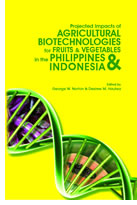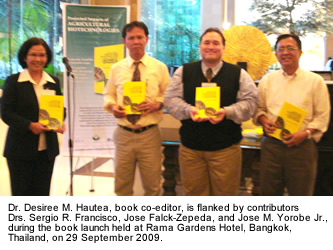
Socioeconomic Impacts of Biotech Crops in Philippines and Indonesia
October 9, 2009| |
 Substantial economic benefits are projected for research and development activities that have been undertaken to commercialize genetically modified products to solve major insect and disease problems in the Philippines and Indonesia. Bioengineered products such as transgenic papaya ringspot virus resistant papaya, insect resistant (Bt) eggplant, and multiple virus resistant (MVR) tomato in the Philippines, and late blight resistant potato, insect resistant (Bt) potato, and MVR tomato in Indonesia, are projected to earn high returns that justify the investments in their research and commercialization. These are forwarded in a book Projected Impacts of Agricultural Biotechnologies for Fruits and Vegetables in the Philippines and Indonesia, edited by Drs. George Norton and Desiree Hautea of the Virginia Polytechnic Institute and State University, USA and University of the Philippines Los Banos, respectively.
Substantial economic benefits are projected for research and development activities that have been undertaken to commercialize genetically modified products to solve major insect and disease problems in the Philippines and Indonesia. Bioengineered products such as transgenic papaya ringspot virus resistant papaya, insect resistant (Bt) eggplant, and multiple virus resistant (MVR) tomato in the Philippines, and late blight resistant potato, insect resistant (Bt) potato, and MVR tomato in Indonesia, are projected to earn high returns that justify the investments in their research and commercialization. These are forwarded in a book Projected Impacts of Agricultural Biotechnologies for Fruits and Vegetables in the Philippines and Indonesia, edited by Drs. George Norton and Desiree Hautea of the Virginia Polytechnic Institute and State University, USA and University of the Philippines Los Banos, respectively.
The book presents the projected level and distribution of costs and benefits associated with the featured biotech crops based from a series of ex-ante impact assessment studies supported by the Agricultural Biotechnology Support Project II (ABSPII) and the International Service for the Acquisition of Agri-biotech Applications (ISAAA). The book is co-published by ISAAA and the Southeast Asian Regional Center for Graduate Study and Research in Agriculture (SEARCA).

Inquiries about the book can be made by emailing isaaa-seasia@isaaa.org or jap@agri.searca.org. The e-copy of the book can be downloaded at http://www.isaaa.org/resources/publications/default.html#projectedimpacts2009
| |
Biotech Updates is a weekly newsletter of ISAAA, a not-for-profit organization. It is distributed for free to over 22,000 subscribers worldwide to inform them about the key developments in biosciences, especially in biotechnology. Your support will help us in our mission to feed the world with knowledge. You can help by donating as little as $10.
-
See more articles:
-
News from Around the World
- Need for More Investment in Agriculture Says FAO
- Nobel Honors Works on Telomeres and Ribosome
- Climate Change and Impact on Food Security
- Importance of Predicting Flowering Time and Crop Yield in Future Climates
- Desertification and Climate Change
- Partnership to Strengthen Parliamentary Action to Support Agric Development
- USDA Joins FDA Efforts to Develop New Food Safety Regulations
- USDA Awards $11 M for Applied Plant Genomics Research and Extension
- Maui Council Approves GM Taro Ban
- Productive Corn Plants with the Right Resources
- Genuity SmartStax Trial Plots Demonstrate Efficacy Against Corn Earworm
- Genome Prairie Projects Granted Provincial Funding
- Socioeconomic Impacts of Biotech Crops in Philippines and Indonesia
- New Pulse Varieties to Boost Growers' Options
- GM Cotton Yield Comparing Well Against Commercial Varieties
- Japan Commits USD 25 million to International Rice Research
- EFSA and NGOs Meet to Discuss GMOs
- Researchers Receive USD 1.6 million to Study Honeybee Decline
- Low Impact of GM Over Conventional Maize
- Growing Greener Greens
- New Plant Genomics Portal Expected to Support Research Into Improved Crops
-
Research Highlights
- From Teosinte to Maize, An Evolutionary Farce?
- Expression of Wheat Genes in Maize Kernels Improves Wet Milling Yields
-
Announcements
- National Seminar on Enzyme Biotechnology in Indonesia
-
Resources
- ISAAA's Tribute to Dr. Norman Borlaug
- Vietnam GMO Biosafety Management Decree for Comment
- Millions Fed: Proven Successes in Agricultural Development, A new IFPRI Book
-
Read the latest: - Biotech Updates (January 21, 2026)
- Gene Editing Supplement (January 28, 2026)
- Gene Drive Supplement (February 22, 2023)
-
Subscribe to BU: - Share
- Tweet
